#additive synthesis
Explore tagged Tumblr posts
Video
youtube
NASA ARP
A stochastic experiment with two ARP 2600s.
The ARP synthesiser was invented by Alan Robert Pearlman, a NASA engineer, in 1969.
The ARP 2500 was used in the 5 notes sequence of the film Close Encounters of the Third Kind, played by Phil Dodds, of ARP.
https://on.soundcloud.com/DyHXt
#youtube#electronicmusic#synthesizer#modular synthesis#subtractive synthesis#additive synthesis#modular synthesiser#arp2600#nasa#space#ambient music#ambient#ethereal#eerie#soundscape#science fiction#scifi#close encounters of the third kind
2 notes
·
View notes
Text

0 notes
Audio
Most of the time i post photo's here, but my main occupation is composing experimental music. Check out my newest album: Compositions with pure tones
A series of very abstract compositions, for which the source material was generated through additive synthesis with pure sine tones. The pitch, envelope and volume of 100 oscillators was controlled via algorithms to create a wide variety of sounds and sonic evolutions. A selection of those sounds was then further processed and combined in several layers in a more intuitive way.
Best listened to on good quality speakers or headphones on moderate volume. Contains a lot very high and low frequencies which will not reproduce correctly on cheap speakers like the ones builtin in laptops or smartphones.
Listen/purchase: Compositions with pure tones by kristof lauwers
#bandcamp#music#soundscape#electroacoustic#art music#additive synthesis#avant-garde#avant-garde music#contemporary classical#algorithmic music#experimental music#acousmatic#computer music#computer generated
1 note
·
View note
Text
other's hyperfixations and special interests are about story-related stuff while on the other hand mine is literally just
CONVERTING AUDIO TO MIDI THROUGH METHODS INVOLVING SHORT TIME FOURIER TRANSFORM AND ADDITIVE SYNTHESIS PITCH CHANGE EVENTS AND VELOCITY EVENTS OR CHUNKING ONLINE SEQUENCER FFT FAST FOURIER TRANSFORM
#audio to midi#fourier#fourier transform#additive synthesis#midi#black midi#fft#mp3#mp3 to midi#wav to midi#online sequencer
0 notes
Text
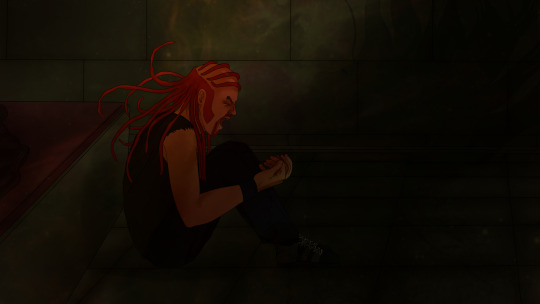
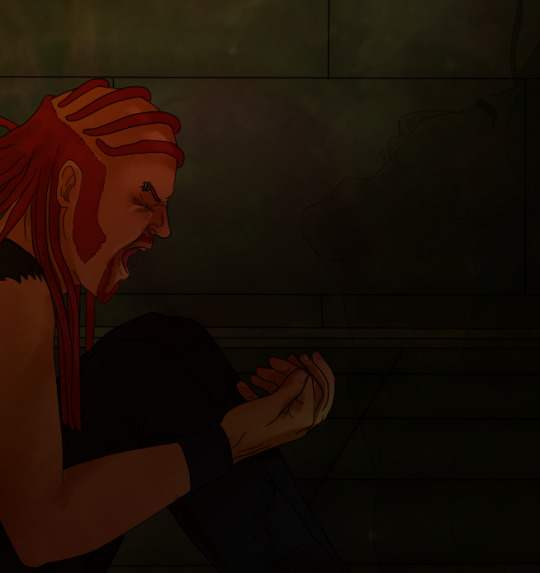
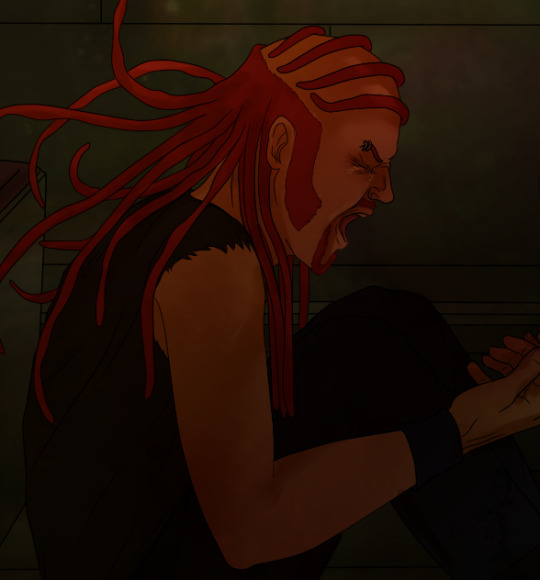
Artwork finished for the story Nightmares Run Wild. (Had to draw this to get some tension out of my system)
>>next<< The story of (almost) losing a best friend (but being just as traumatic) was heavily inspired by pausing the movie's end, way too many times. So here's a quick summary under the cut for those who need it:


He was left behind, frozen. It only lasted a few moments in the movie, but they've made so many scenes of Pickles still not moving from Nathan's side after minutes long, maybe an hour too of dragging his body across the snowy terrain.
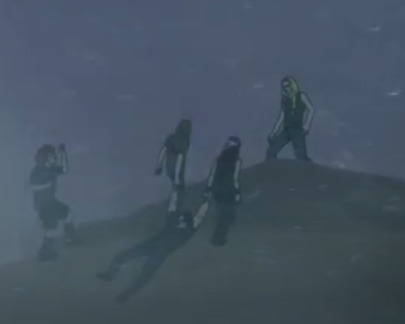


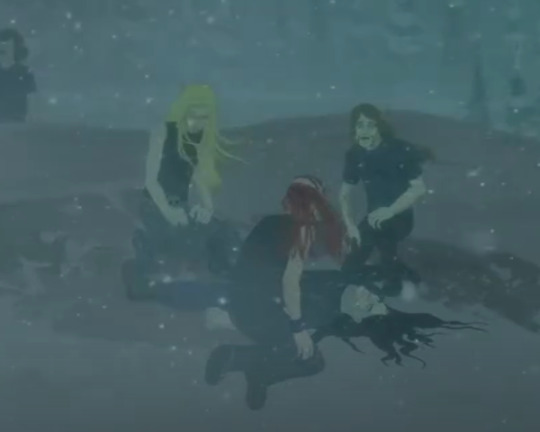
Pickles lost his instinct to cover his head from a lightning bolt.

Then his eyes, when he finally saw Nathan live.
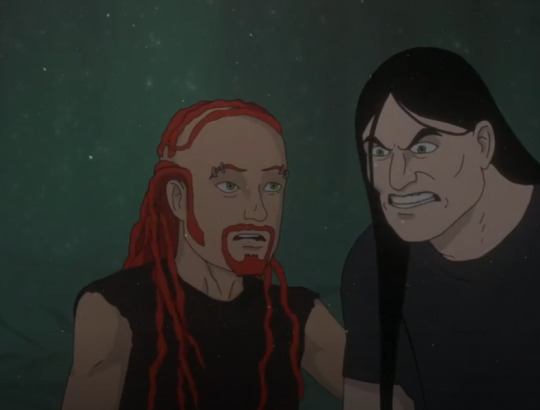
Someone give this man a break.
#metalocalypse#mtl#dethklok#mtl fanart#metalocalypse fanart#dethklok fanart#pickles the drummer#nathan explosion#in the background of the painting a star is dying#since I've made the two galaxies merging together concept a nebulea collapsing after losing a huge chunk of itself looked only logical here#nickles#kind of?#post aotd#mtl aotd#I used a bit of color theory here for fun. when you look at the rgb additive color synthesis diagram#you can notice that when you subtract blue you get green. yellow. and red. this was made bc Nathan's color is blue#mtl artwork
111 notes
·
View notes
Text
i think i was giving off way too much manic pixie dream girl energy (wearing overalls) at my friend's house tonight because allegedly two of her weird friends that were there separately thought i was interested in them and asked for my number😐
#she texted me and i was like wow i was not flirting with anyone i was just passionate talking about why i hate organic synthesis labwork#ok i guess in addition to wearing overalls i was also wearing socks with a sunday at la grande jette on them#which definitely constitutes a mpdg look#this is probably why i only get attention from weird dude despite being somewhat conventionally attractive
18 notes
·
View notes
Text

One-step, high-speed, thermal-electric aerosol printing of piezoelectric bio-organic films
Amidst the ongoing surge in demand for bio-MEMS, wearable/implantable electronics and bio-tissue therapeutics, the pursuit of piezoelectric biomaterials has become a priority, thanks to their remarkable electromechanical properties, biocompatibility, and bioresorbability. However, their technological potential is restrained by the challenges of precise manipulation of nano-biomolecules, controlling their growth across the nano-to-macro hierarchy, and tuning desirable mechanical properties. Since the discovery of biological piezoelectricity in wool and hair in 1941, attempts to activate piezoelectricity in biomaterials through external electrical poling have proven largely unsuccessful. For 80 years, the challenge has remained unaddressed, forming a huge gap between laboratory piezoelectric biomaterials and practical bio-devices.
Read more.
#Materials Science#Science#Piezoelectric#Aerosol#Thin films#Biomaterials#Organic materials#Materials Synthesis#Additive manufacturing
9 notes
·
View notes
Text
*puts on beret picks up cigarette holder and starts talking about differences between the TTYD remake soundtrack and the original*
#well you see.... ze use of dynamic tracking is a definite enhancement. zis cannot be argued... HOWEVER#the choral vocal synthesizer has disgustingly wide vibrato. this is particularly observable in the final chapter where it causes the#entire sinister atmosphere to become melodramatic / modernday adventure movie esque. too orchestral. truly robs the original of its impact.#and is not explainable by hardware limitation whatsoever. there are marked improvements in not only using waveform synthesis...#e.g. the choral pads that pop up in the new sewers theme. very tasteful. chimes in the thousand year door chamber. shamisen in glitzville.#electric guitar. definitive improvements. additionally bringing modern music sensabilities can be an enhancement: grodus' battle theme#conveys his seriousness much better with an industrial electronic edge to it. plenty of additional examples throughout.#however. comparing the final boss themes there is this ``enshittification'' of videogame remakes that can be seen#the major hollywood adventure movie soundtrack problem aforementioned. play enough remakes and you'll notice it. blending into the same.#the shadow queen is meant to have an air of ``sickliness''. of gloom. kinda her whole deal. lost in the remake in my opinion.#(i am almost tempted to gather audio clips and play them side by side. to an audience of absolutely ZERO)#this is not even mentioning that there are no BEES in the remake's final battle theme. <- the punchline of this entire thing#anyways. this post was inevitable. i have an insane ear for soundtracks and sfx as u may have gathered.
5 notes
·
View notes
Text

High-Purity Nanomaterials & Graphene Nanoplatelets Powder Supplier
Nanochemazone is a global leader in advanced nanomaterials, offering high-purity Graphene Nanoplatelets Powder, MXenes, metal oxides, and custom nanoparticles for research and industrial use.
#research chemicals#chemicalindustry#2d materials#science#Core–Shell Nanoparticle Uses#Graphene Oxide Nanoparticles#PTFE Suspension Resin Powder#Calcium Carbonate Nanoparticles#Nanoparticles Supplier#High Purity Nanopowders#Advanced Nanomaterials#Buy MXene Online#Graphene Nanoplatelets#Carbon Nanotubes Bulk#Custom Nanomaterial Synthesis#Laboratory Grade Nanomaterials#Metal Oxide Nanopowders#Nano Additive Manufacturing
0 notes
Text
youtube
Intro to Synthesis Part 2, types of synthesis
#synthesis#synth#synthesizer#additive#subtractive#fm#modulation#phase#samplers#hybrid#amplifier#oscillator#dco#vco#vcf#vca#dcf#dca#resonance#amount#envelope#modulator#adsr#pitch#lfo#sync#tutorials#Youtube#ny#newyork
0 notes
Text
so the thing about "read theory" as a mantra: in the social media sphere there is a consistent downplaying of what that kind of commitment actually entails, plus a consistent obfuscation of what exactly the commitment is necessary for.
let's say that you're interested in learning more about specifically "Marxist theory." This, I think, also raises a bunch of questions about what we mean by theory - works of political philosophy, texts on revolutionary and military strategy, political speeches, journalistic or sociological analysis, historiography - these varying things with very different discursive norms and standards of evidence or logic often get rolled into one singular object called "theory." but let's set that aside for now.
you want to learn this for maybe an assortment of reasons, here's a few (non-exhaustive) good ones:
Marxism has been a substantial historical force that has probably had a notable impact on the world around you in some way.
Learning about Marx/ism might offer some level of insight into your current social world that other things are unable to offer.
Many texts - Capital, The Wretched of the Earth, The Second Sex, The State and Revolution - are also world-historical forms of political literature, which is interesting.
Follow-up to 2 - maybe having some level of familiarity with these things will give you the ability to better articulate yourself and participate in social and political movements around you.
generally speaking the Social Media Marxist approach is to tell you to go read off a list of texts of whatever writers the author personally agrees with or whatever works she happens to have read. so you decide to start with the big guy Marx, who is at the top of the list. totally reasonable decision.
however, there are a few contextual questions that might reasonably come up when doing so.
first, it will be clear that Marx did not pop out of an intellectual vacuum; Lenin has a rather popular identification of the "three sources of Marxism" - post-Hegelian German philosophy, French socialism, and English political economy. from my perspective, these are more like three of his main objects of ire (and so in some sense are both influences and also breakages - but not strictly speaking a synthesis), but I digress. so, frequently, in order to grasp what Marx is talking about or responding to, you are going to need some level of familiarity with a lot of additional people: Smith, Ricardo, Malthus, Hegel, Bauer, Feuerbach, Hobbes, Spinoza, Rousseau, Mill, Sismondi. suddenly you are not just learning about the works of one guy, but his attitude towards all the people he relies on for support or aims his criticisms at. and each of those different intellectual relationships is going to be different. sometimes at different times!
second, and relatedly, Marx is not always the most charitable to the people he's criticizing, who were often rival socialists (so there were pretty notable political and personal stakes at work in proving them wrong or diminishing their influence over the movement). the introductory materials to the new translation of Capital also observe that Marx's approach to scholarship is, shall we say, haphazard; often he makes quotes or citations that are not actually representative of what he's citing. finally, many of the people he's criticizing have sort of been rendered obsolete historically *in no small part* due to the success of Marxism as a political orientation in the late 19th and early 20th centuries. so to determine whether Marx is being fair to the people he is basing his critique on, we will have to do some level of intellectual work to check. so now we're not just evaluating Marx's relationship to different thinkers but also the substantial content of each of those thinkers themselves.
third, Marx did not pop out of a social vacuum. all of these different writers didn't just crop up from nowhere but wrote within particular sociohistorical contexts, some of which were rather divorced from the European revolutionary wave, first worldwide financial crisis, and the shifting character of the United States in the wake of the Civil War and the formal abolition of slavery - some of the historical events that Marx was more explicitly engaging with. and the radical liberals, republicans, and socialists Marx criticized all also had their own intellectual and social histories. so now we're getting a little far afield from the initial notion, which was just to read some guy, and getting into the realm of social history, and trying to understand the relationship between world history and the ideas produced within it.
fourth, you are a subject in the world, which is to say YOU did not pop out of a social or intellectual vacuum. you likely bring predispositions, assumptions, biases, and cognitive distortions to what you read; we all do. working through those and trying to note where they're happening - where they might be fine and where they might be problematic - will require a certain willingness to reflect, to write, to take notes, to analyze and self-scrutinize, and to be critical of both yourself as a reader and of the text you are reading. (a nested problem is that we have a truly staggering amount of material from Marx and Engels, and you might have to make certain determinations as to which material is important or worthwhile or more useful, and identify the standards by which you think that - all of which requires a certain reflection on your status as a political thinker).
okay, so consider all that. we started with "I wanna read this one guy," we end with "to really grasp the work of this one guy it's also important to know both preceding and contemporaneous world history, his intellectual influences, and the gaps or silences or errors in his work.” now consider that, if you really want to be able to speak on them with some level of confidence and intellectual honesty, you have to apply approximately the same level of rigor to every other writer on the Social Media Marxist approved list - Lenin, Fanon, Che, Kollontai, Cabral, Mao, Luxemburg, whoever. not to mention their critics, both direct and indirect!
Marx developed his work through an incredibly sustained engagement with enormous volumes of different material; we have entire notebooks of him poring over Max Stirner, or Spinoza, or the political economists, or the empirical observations of English factory inspectors. I'm not saying that you have to do that, or even that one strictly *has* to go down any or all of the first three rabbitholes I identified. Marx was in the somewhat unique position of sustaining himself through the support of Engels and his journalistic work, as a product of being in perpetual exile. that's not the kind of position that most of us are typically in.
the point is not "commit yourself to being a perfect monastic scholar in order to reach perfect truth" - such a thing is probably a fantasy, even if we wish otherwise. the point is that if you think "theory" is worth taking seriously, well, you have to actually take it seriously. if you don’t think it has stakes or utility, that’s fine; different people find different things useful. I think “theory” is not a set of dead letters by canonical authors but produced through social life. but if “reading theory” is a way to clarify and assert yourself as a political subject and agent, to claim some intellectual autonomy and acquire some understanding that you can put into practice in your life, then that’s demanding. it’s not impossible, but it does take real effort and a commitment to study and a certain level of resistance to being dogmatic. otherwise you are just letting yourself be rhetorically persuaded by whatever is in front of you or whatever affirms your biases.
as Marx says in the preface to Capital, Volume I, "I am of course assuming that my readers will want to learn something new, and so are ready to think for themselves."
922 notes
·
View notes
Audio
Fantasie, Fuge und Toccata in Japanischen Modi
An experiment, with transposing thirteen of Johann Sebastian Bach's Fantasias, Toccatas And Fugues, to the major and minor pentatonic modes of Japanese classical music.
Performed on the Oberheim OB-EZ 8 Voice synthesiser, a gift from GForce Software.
Please enjoy 1 hour and 47 minutes of Baroque Japanese tranquillity.
#classical music#japanese music#experimental music#johann sebastian bach#j s bach#bach#fantasia#toccata#fugue#toccata and fugue#electronic music#synthesizer#subtractive synthesis#additive synthesis#oberheim#oberheim 8 voice#ob-ez#gforce software#soundcloud
0 notes
Note
For the Reverse Unpopular Opinion meme, Lamarckism!
(This is an excellent ask.)
Lamarck got done a bit dirty by the textbooks, as one so often is. He's billed as the guy who articulated an evolutionary theory of inherited characteristics, inevitably set up as an opponent made of straw for Darwin to knock down. The example I recall my own teachers using in grade school was the idea that a giraffe would strain to reach the highest branches of a tree, and as a result, its offspring would be born with slightly longer necks. Ha-ha-ha, isn't-that-silly, isn't natural selection so much more sensible?
But the thing is, this wasn't his idea, not even close. People have been running with ideas like that since antiquity at least. What Lamarck did was to systematize that claim, in the context of a wider and much more interesting theory.
Lamarck was born in to an era where natural philosophy was slowly giving way to Baconian science in the modern sense- that strange, eighteenth century, the one caught in an uneasy tension between Newton the alchemist and Darwin the naturalist. This is the century of Ben Franklin and his key and his kite, and the awed discovery that this "electricity" business was somehow involved in living organisms- the discovery that paved the way for Shelley's Frankenstein. This was the era when alchemy was fighting its last desperate battles with chemistry, when the division between 'organic' and 'inorganic' chemistry was fundamental- the first synthesis of organic molecules in the laboratory wouldn't occur until 1828, the year before Lamarck's death. We do not have atoms, not yet. Mendel and genetics are still more than a century away; we won't even have cells for another half-century or more.
Lamarck stepped in to that strange moment. I don't think he was a bold revolutionary, really, or had much interest in being one. He was profoundly interested in the structure and relationships between species, and when we're not using him as a punching bag in grade schools, some people manage to remember that he was a banging good taxonomist, and made real progress in the classification of invertebrates. He started life believing in the total immutability of species, but later was convinced that evolution really was occurring- not because somebody taught him in the classroom, or because it was the accepted wisdom of the time, but through deep, continued exposure to nature itself. He was convinced by the evidence of his senses.
(Mostly snails.)
His problem was complexity. When he'd been working as a botanist, he had this neat little idea to order organisms by complexity, starting with the grubbiest, saddest little seaweed or fern, up through lovely flowering plants. This was not an evolutionary theory, just an organizing structure; essentially, just a sort of museum display. But when he was asked to do the same thing with invertebrates, he realized rather quickly that this task had problems. A linear sorting from simple to complex seemed embarrassingly artificial, because it elided too many different kinds of complexity, and ignored obvious similarities and shared characteristics.
When he went back to the drawing board, he found better organizing schema; you'd recognize them today. There were hierarchies, nested identities. Simple forms with only basic, shared anatomical patterns, each functioning as a sort of superset implying more complex groups within it, defined additively by the addition of new organs or structures in the body. He'd made a taxonomic tree.
Even more shockingly, he realized something deep and true in what he was looking at: this wasn't just an abstract mapping of invertebrates to a conceptual diagram of their structures. This was a map in time. Complexities in invertebrates- in all organisms!- must have been accumulating in simpler forms, such that the most complicated organisms were also the youngest.
This is the essential revolution of Lamarckian evolution, not the inherited characteristics thing. His theory, in its full accounting, is actually quite elaborate. Summarized slightly less badly than it is in your grade school classroom (though still pretty badly, I'm by no means an expert on this stuff), it looks something like this:
As we all know, animals and plants are sometimes generated ex nihilo in different places, like maggots spontaneously appearing in middens. However, the spontaneous generation of life is much weaker than we have supposed; it can only result in the most basic, simple organisms (e.g. polyps). All the dizzying complexity we see in the world around us must have happened iteratively, in a sequence over time that operated on inheritance between one organism and its descendants.
As we all know, living things are dynamic in relation to inorganic matter, and this vital power includes an occasional tendency to gain in complexity. However, this tendency is not a spiritual or supernatural effect; it's a function of natural, material processes working over time. Probably this has something to do with fluids such as 'heat' and 'electricity' which are known to concentrate in living tissues. When features appear spontaneously in an organism, that should be understood as an intrinsic propensity of the organism itself, rather than being caused by the environment or by a divine entity. There is a specific, definite, and historically contingent pattern in which new features can appear in existing organisms.
As we all know, using different tissue groups more causes them to be expressed more in your descendants, and disuse weakens them in the same way. However, this is not a major feature in the development of new organic complexity, since it could only move 'laterally' on the complexity ladder and will never create new organs or tissue groups. At most, you might see lineages move from ape-like to human-like or vice versa, or between different types of birds or something; it's an adaptive tendency that helps organisms thrive in different environments. In species will less sophisticated neural systems, this will be even less flexible, because they can't supplement it with willpower the way that complex vertebrates can.
Lamarck isn't messing around here; this is a real, genuinely interesting model of the world. And what I think I'm prepared to argue here is that Lamarck's biggest errors aren't his. He has his own blind spots and mistakes, certainly. The focus on complexity is... fraught, at a minimum. But again and again, what really bites him in the ass is just his failure to break with his inherited assumptions enough. The parts of this that are actually Lamarckian, that is, are the ideas of Lamarck, are very clearly groping towards a recognizable kind of proto-evolutionary theory.
What makes Lamarck a punching bag in grade-school classes today is the same thing that made it interesting; it's that it was the best and most scientific explanation of biological complexity available at the time. It was the theory to beat, the one that had edged out all the other competitors and emerged as the most useful framework of the era. And precisely none of that complexity makes it in to our textbooks; they use "Lamarckianism" to refer to arguments made by freaking Aristotle, and which Lamarck himself accepted but de-emphasized as subordinate processes. What's even worse, Darwin didn't reject this mechanism either. Darwin was totally on board with the idea as a possible adaptive tendency; he just didn't particularly need it for his theory.
Lamarck had nothing. Not genetics, not chromosomes, not cells, not atomic theory. Geology was a hot new thing! Heat was a liquid! What Lamarck had was snails. And on the basis of snails, Lamarck deduced a profound theory of complexity emerging over time, of the biosphere as a(n al)chemical process rather than a divine pageant, of gradual adaptation punctuated by rapid innovation. That's incredible.
There's a lot of falsehood in the Lamarckian theory of evolution, and it never managed to entirely throw off the sloppy magical thinking of what came before. But his achievement was to approach biology and taxonomy with a profound scientific curiosity, and to improve and clarify our thinking about those subjects so dramatically that a theory of biology could finally, triumphantly, be proven wrong. Lamarck is falsifiable. That is a victory of the highest order.
2K notes
·
View notes
Text

My next art was supposed to be something else, but I made a Ghoul oc instead, whoops!
So here’s Prism! They are a Multighoul of all five elements, and I made them following the opposite idea of Swiss. Swiss was based around the idea of Subtractive color synthesis (mix all colors and you get black), while Prism was made on the idea of Additive color synthesis (layer all colors and you get white).
All of their features are indicative of the different elements, and I’ll go over it all if anyone is curious (PLEASE BE CURIOUS, PLEASE SEND ASKS, I WANNA YAP).
#the band ghost#nameless ghouls#nameless ghoul oc#ghoul oc#the band ghost oc#prism ghoul#art#my art#my oc art
682 notes
·
View notes
Text

The return of my Ink variant AKA Opal from Parallel Synthesis!
He got a bit of an outfit update since the last time I posted anything related to my AU, and honestly there's a lot of small adjustments and additions I wanna do. Here's hoping I can get to them!
Ink belongs to Comyet
Parallel Synthesis AU belongs to me
#undertale multiverse#utmv#ink sans#ink!sans#parallel synthesis#parasynth#parasynth opal#undertale au#fanart#myart#hes a lot more colorful now :D#im hoping to do an updated character sheet for everyone soon!
129 notes
·
View notes
Note
Hai, I saw ur post on generative AI and couldn’t agree more. Ty for sharing ur knowledge!!!!
Seeing ur background in CS,,, I wanna ask how do u think V1 and other machines operate? My HC is that they have a main CPU that does like OS management and stuff, some human brain chunks (grown or extracted) as neural networks kinda as we know it now as learning/exploration modules, and normal processors for precise computation cores. The blood and additional organs are to keep the brain cells alive. And they have blood to energy converters for the rest of the whatevers. I might be nerding out but I really want to see what another CS person would think on this.
Btw ur such a good artist!!!! I look up to u so much as a CS student and beginner drawer. Please never stop being so epic <3

okay okay okAY OKAY- I'll note I'm still ironing out more solid headcanons as I've only just really started to dip my toes into writing about the Ultrakill universe, so this is gonna be more 'speculative spitballing' than anything
I'll also put the full lot under a read more 'cause I'll probably get rambly with this one
So with regards to machines - particularly V1 - in fic I've kinda been taking a 'grounded in reality but taking some fictional liberties all the same' kind of approach -- as much as I do have an understanding and manner-of-thinking rooted in real-world technical knowledge, the reality is AI just Does Not work in the ways necessary for 'sentience'. A certain amount of 'suspension of disbelief' is required, I think.
Further to add, there also comes a point where you do have to consider the readability of it, too -- as you say, stuff like this might be our bread and butter, but there's a lot of people who don't have that technical background. On one hand, writing a very specific niche for people also in that specific niche sounds fun -- on the other, I'd like the work to still be enjoyable for those not 'in the know' as it were. Ultimately while some wild misrepresentations of tech does make me cringe a bit on a kneejerk reaction -- I ought to temper my expectations a little. Plus, if I'm being honest, I mix up my terminology a lot and I have a degree in this shit LMFAO
Anyway -- stuff that I have written so far in my drafts definitely tilts more towards 'total synthesis even of organic systems'; at their core, V1 is a machine, and their behaviors reflect that reality accordingly. They have a manner of processing things in absolutes, logic-driven and fairly rigid in nature, even when you account for the fact that they likely have multitudes of algorithmic processes dedicated to knowledge acquisition and learning. Machine Learning algorithms are less able to account for anomalies, less able to demonstrate adaptive pattern prediction when a dataset is smaller -- V1 hasn't been in Hell very long at all, and a consequence will be limited data to work with. Thus -- mistakes are bound to happen. Incorrect predictions are bound to happen. Less so with the more data they accumulate over time, admittedly, but still.
However, given they're in possession of organic bits (synthesized or not), as well as the fact that the updated death screen basically confirms a legitimate fear of dying, there's opportunity for internal conflict -- as well as something that can make up for that rigidity in data processing.
The widely-accepted idea is that y'know, blood gave the machines sentience. I went a bit further with the idea, that when V1 was created, their fear of death was a feature and not a side-effect. The bits that could be considered organic are used for things such as hormone synthesis: adrenaline, cortisol, endorphins, oxycotin. Recipes for human instinct of survival, translated along artificial neural pathways into a language a machine can understand and interpret. Fear of dying is very efficient at keeping one alive: it transforms what's otherwise a mathematical calculation into incentive. AI by itself won't care for mistakes - it can't, there's nothing actually 'intelligent' about artificial intelligence - so in a really twisted, fucked up way, it pays to instil an understanding of consequence for those mistakes.
(These same incentive systems are also what drive V1 to do crazier and crazier stunts -- it feels awesome, so hell yeah they're gonna backflip through Hell while shooting coins to nail husks and demons and shit in the face.)
The above is a very specific idea I've had clattering around in my head, now I'll get to the more generalized techy shit.
Definitely some form of overarching operating system holding it all together, naturally (I have to wonder if it's the same SmileOS the Terminals use? Would V1's be a beta build, or on par with the Terminals, or a slightly outdated but still-stable version? Or do they have their own proprietary OS more suited to what they were made for and the kinds of processes they operate?)
They'd also have a few different kinds of ML/AI algorithms for different purposes -- for example, combat analysis could be relegated to a Support Vector Machine (SVM) ML algorithm (or multiple) -- something that's useful for data classification (e.g, categorizing different enemies) and regression (i.e predicting continuous values -- perhaps behavioral analysis?). SVMs are fairly versatile on both fronts of classification and regression, so I'd wager a fair chunk of their processing is done by this.
SVMs can be used in natural language processing (NLP) but given the implied complexity of language understanding we see ingame (i.e comprehending bossfight monologues, reading books, etc) there's probably a dedicated Large Language Model (LLM) of some kind; earlier and more rudimentary language processing ML models couldn't do things as complex as relationship and context recognition between words, but multi-dimensional vectors like you'd find in an LLM can.
Of course if you go the technical route instead of the 'this is a result of the blood-sentience thing', that does leave the question of why their makers would give a war machine something as presumably useless as language processing. I mean, if V1 was built to counter Earthmovers solo, I highly doubt 'collaborative effort' was on the cards. Or maybe it was; that's the fun in headcanons~
As I've said, I'm still kinda at the stage of figuring out what I want my own HCs to be, so this is the only concrete musings I can offer at the minute -- though I really enjoyed this opportunity to think about it, so thank you!
Best of luck with your studies and your art, anon. <3
21 notes
·
View notes